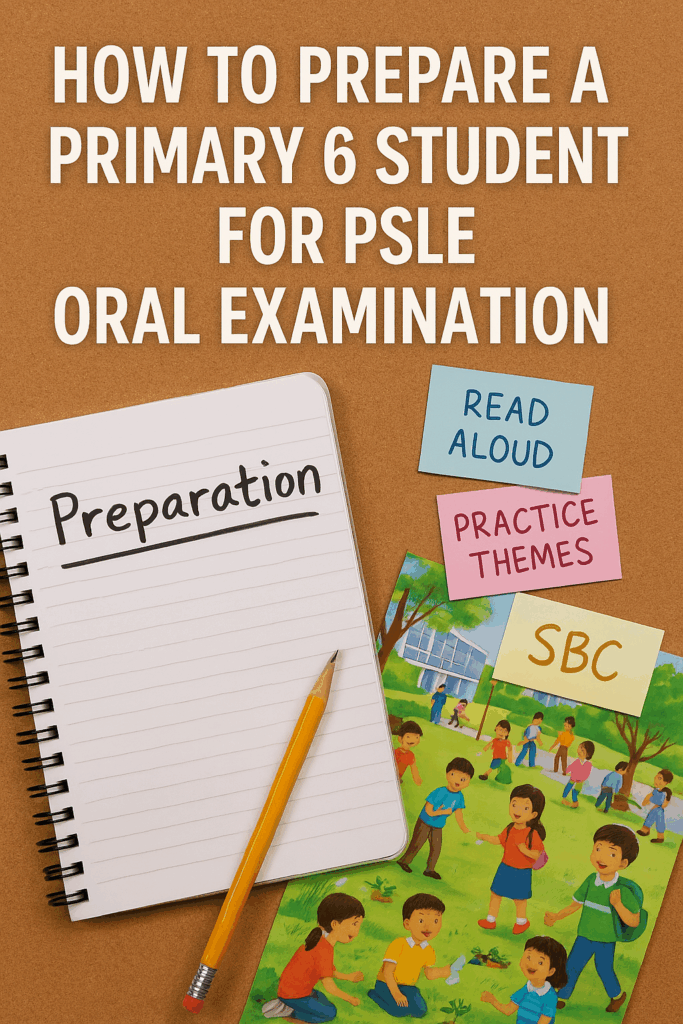As a mum of two, and my eldest just finished his PSLE last year, I just want to share my whole journey prepare my kid for his PSLE Oral exam. It was like a rollercoaster – up and down, stress here stress there, especially during oral exam period. But after going through it once, I want to share my own experience and some tried-and-tested methods from other mums and tutors that really helped my son do well for his PSLE oral. Hopefully can help your child also!
This article is more for English Oral but some tips can apply to Chinese Oral too lah. So grab your kopi and read on.
🌟 First, Understand the PSLE Oral Format
Let’s not blur blur when helping our kids. The PSLE English Oral is made up of two parts:
- Reading Aloud (10 marks)
- Stimulus-Based Conversation (SBC) (20 marks)
Total 30 marks, but these marks really matter, especially when your kid borderline between AL2 and AL3. A strong oral can pull up the grade, no joke!
📖 Reading Aloud: Confidence is Key
I used to think reading just need to pronounce properly. But actually, the markers look for:
- Clear articulation
- Appropriate pauses
- Expression (intonation, tone)
What we did at home:
- Daily practice: I got my son to read aloud 1-2 passages from The Straits Times Little Red Dot or those PSLE oral practice books. Important to use authentic text, not too kiddy ones.
- Record and replay: Ask them to use your handphone to record themselves reading, then replay to listen. Very effective for them to hear their own mistakes. My son didn’t believe me until he heard himself mumbling in the recording!
- Mummy modelling: Sometimes I read first with proper pauses and emotion, then he mimic. I’m no English teacher, but kids learn from adults more than you think.
🗣️ Stimulus-Based Conversation (SBC): Cannot Just Memorise Model Answers
This one really scary for a lot of kids, even adults also sometimes tongue-tied. The examiners will show a picture (e.g. recycling, sports, school canteen), then ask your child three questions.
Here’s what they’re looking for:
- Personal response
- Clarity and fluency
- Vocabulary and grammar
- Most importantly: ability to extend the conversation beyond “yes/no”
How we prepared:
1. Expose to common PSLE themes
I made a list based on past year topics from other parents (you can Google or join Facebook PSLE groups). Themes include:
- Healthy lifestyle
- Helping others
- Environmental issues
- Road safety
- Celebrations and festivals
- Kindness and respect
So every few days, we pick one theme, find a photo online, and practice.
2. Use the “OREO” Method
This one my son’s tutor taught him, and it really helped structure his answers:
- O – Opinion
- R – Reason
- E – Example (real-life story)
- O – Opinion again (wrap up)
Example:
Q: “Would you help a friend who is being bullied?”
O – Yes, I would help.
R – Because I believe it’s important to stand up for others.
E – I once saw a boy getting pushed in school and I told the teacher.
O – I feel we should never stay silent when we see someone in trouble.
Simple right? But clear and personal.
3. Don’t be afraid of Singlish lah – but know when to switch
At home, we use Singlish, yes. But during oral, remind your child to switch to standard English. This one needs practice, especially when they nervous.
What I did was to role-play with him every evening. I pretend to be the examiner, then I “test” him. Sometimes I purposely act fierce to simulate exam pressure. 😅
💬 Vocabulary Bank and Phrases
Every time we come across a good phrase, we write in his oral notebook. Like:
- “It was a once-in-a-lifetime experience…”
- “In my opinion, …”
- “I still remember vividly…”
- “It taught me an important lesson…”
This makes their answer sound more mature and expressive. Don’t need bombastic words, just useful ones.
😬 What If My Child Is Shy or Low in Confidence?
My son used to mumble, super soft-spoken. So I did these:
- Mirror practice: Let them see themselves speak. Tell them to smile, maintain eye contact.
- Praise effort, not just results: Every time he spoke up, I praised him even if the content not so solid.
- Record progress: Keep some early recordings, then after a month, let them hear again. Can see improvement – they feel proud!
🧘♀️ One Week Before Oral Exam – What We Did
- No more new themes – just revision and light practice
- Encourage rest, no need over-drill
- Visit the exam centre if possible, to reduce anxiety
- Pack water bottle, sharpen pencil, mask, IC etc. night before
- Sleep early, wake up earlier on oral day
- Remind them: “Just be yourself and speak like you’re talking to mummy”
✅ On The Day Itself: Mummy’s Pep Talk
Before he went in, I told my son:
“Don’t worry about perfect grammar. Just speak clearly, smile, and be confident. You’ve practised so much – you got this!”
And I also told him: “If you kena a topic you don’t like, just BS a bit and relate to your own life. Examiner not there to scold you.”
Oral exam not just about speaking English. It’s also about mindset, confidence, and the ability to think on the spot. Don’t wait until last minute to prepare – start small and consistent. Even 10 minutes a day makes a difference.
At the end of the day, our job is to guide, support, and cheer them on. Don’t add to their pressure lah. PSLE is important, but our relationship with them more important.
Hope this sharing helps you and your child. All the best to your P6 warrior!
